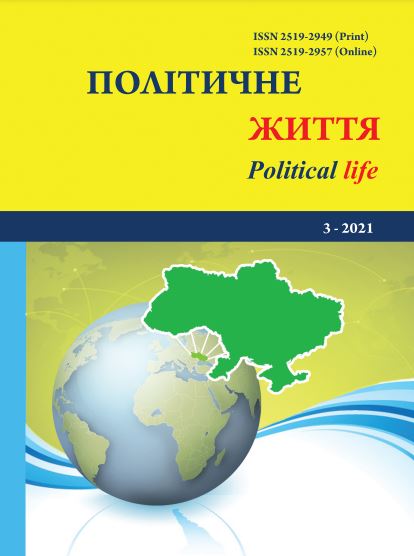Liberal-idealistic Tradition in Peace Studies
DOI:
https://doi.org/10.31558/2519-2949.2021.3.19Keywords:
peace; liberal-idealistic tradition; idealism; liberal internationalism; liberal institutionalism; neoliberalism; liberal peace; democratic peace theoryAbstract
The article analyzes the role of the liberal-idealist tradition in the study of peace. The author provideі information on the general features of the liberal-idealist vision of peace and the anticipation of the perspective opposition to its development in modern international political science. It is recognized that in the modern conditions of changing the nature of war and moderation and subordination of conflict settlement, it is important to create a theoretical basis for peace building. The article emphasizes that theoretical issues of peace are mostly not the subject of academic interest of Ukrainian researchers and the available scientific research is represented by foreign publications. In view of the potential of the liberal-idealist tradition in building peace, domestic science needs a comprehensive research on theories of peace.
The article focuses the reader’s attention on the thesis that idealism laid the foundations for the discussion of peace, vision of peace, understanding of peace. The author reveals the origins of the liberal-idealist vision of peace and characterizes different directions of the liberal-idealist tradition. Particular attention is focused on the discussion of liberal peace and the concept of J. Galtung on positive and negative peace. The thesis that today the theory of democratic peace as a basic vision of peace by neoliberals is the most realistic and achievable version of peace is substantiated.
The article describes in detail idealism, liberal internationalism, liberal institutionalism, liberal pacifism, liberal interventionism, neoliberal institutionalism and compares these approaches. It has been found that these approaches have common features and a common framework for peace research. It is emphasized that these approaches are based on the idea of a universal liberal world not on the basis of hegemony, but on the basis of functional networks and organizations. It is argued that all the above concepts depict an achievable general peace. The article suggests the existence of a liberal consensus on peace, but highlights issues that are still unresolved. According to the author, a broad discussion of peace in the scientific space based on an interdisciplinary approach is needed.
References
Багінський А. Ліберальний мир» як концепція та практика врегулювання конфлікту. Вісник НТУУ «КПІ». Політологія. Соціологія. Право. Випуск 3 (43) 2019. С.15-19.
Кант И. К вечному миру. Москва: «РИПОЛ Классик», 2018. 430 с.
Коротков Д.С. Вплив ліберально-ідеалістичного напрямку на традиційну гегемонію реалістів у теорії міжнародних відносин. Філософія та політологія в контексті сучасної культури. 2020. Т. 12. № 2. С. 87-93.
Парахонський Б. О., Яворська Г. М. Онтологія війни і миру: безпека, стратегія, смисл : монографія. Київ : НІСД, 2019. 560 с.
Chan S. The democratic peace proposition: an agenda for critical analysis. The Economics of Peace and Security Journal. 2009. Vol. 4, No. 1. PP. 70-77. 6
. Doyle M. W. Democratic Peace. Security Studies: a reader/ Ed. by C. Hughes and L. W. Meng. London, New York: Routledge, 2011. PP. 176-183.
Doyle M. W. Kant, Liberal Legacies, and Foreign Affairs. Philosophy and Public Affairs. 1983. Vol. 12. No. 3. PP. 205-235. URL: http://docshare02.docshare.tips/files/26560/265609373.pdf (дата звернення: 09.08.2021).
Francis D. Rethinking War and Peace. London: Pluto Press, 2004. 177 p.
Galtung J. A Synthetic Approach to Peace Thinking. Oslo: International Peace Research Institute, 1967. 238 p. URL: https://cutt.ly/4QDaNkZ (дата звернення: 11.08.2021).
Gobetti Z. A Revision of the Theory of Democratic Peace PP. 21-56. URL: https://heiwa.hiroshimau.ac.jp/Pub/E23/02zenoGobettifinal.pdf (дата звернення: 05.08.2021).
Howard M. The invention of peace and the reinvention of war. London: MacGuru Ltd, 2002. 126 p.
International Encyclopedia of Political Science / Badie B., eds. Los Angeles: Sage, 2011. URL: http://www.stefanorecchia.net/1/137/resources/publication_1040_1.pdf (дата звернення: 09.08.2021).
Keohane R. Neoliberal Institutionalism. Security Studies: a reader/ Ed. by C. Hughes and L. W. Meng. London, New York: Routledge, 2011. PP. 167-175.
Keohane R., Martin L. The Promise of Institutionalist Theory. International Relations. Summer 1995. Vol.20. No.1. PP.39-51.
Lynch С. Kant, the Republican peace, and Moral Guidance in International Law. Ethics and International Affairs. 1994. Vol.8. PP. 39-58. https://cutt.ly/WQS0DWP (дата звернення: 06.08.2021).
Owen J. M. How Liberalism Produces Democratic Peace. International Security. 1994.Vol. 19. No. 2. PP. 87-125.
Pugh J. Democratic Peace Theory: A Review and Evaluation/ CEMPROC Occasional Paper Series. April, 2005. 19 p. URL: https://www.researchgate.net/publication/242284578 (дата звернення: 08.08.2021).
Richmond O. P. Peace in international relations / Routledge studies in peace and conflict resolution; series editors T. Woodhouse and O. Ramsbotham. London: Taylor & Francis e-Library, 2008. 218 p.
Russet B. Neo-Kantian Perspective. Security Studies: a reader/ Ed. by C. Hughes and L. W. Meng. London, New York: Routledge, 2011. PP. 184-189.

